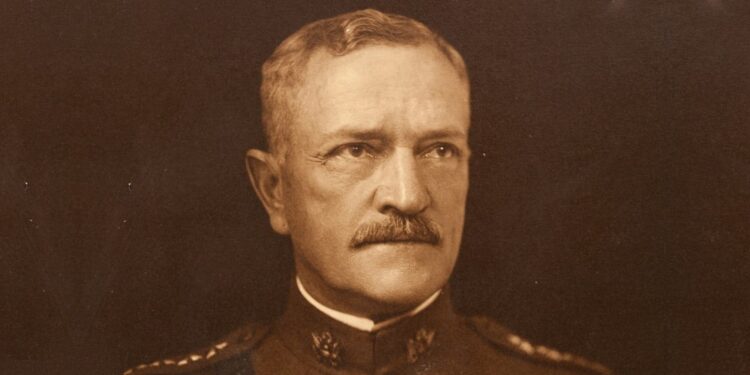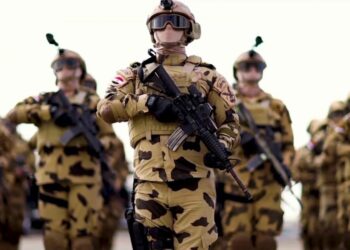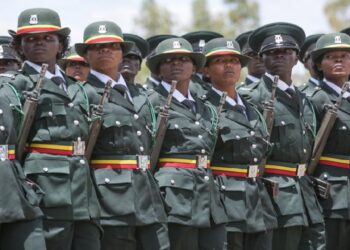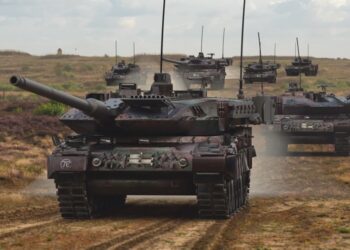General of the Armies John Joseph Pershing, nicknamed “Black Jack”, was a senior United States Army officer. He served most famously as the commander of the American Expeditionary Forces (AEF) on the Western Front during World War I, from 1917 to 1918. In addition to leading the AEF to victory in World War I, John J. Pershing notably served as a mentor to many in the generation of generals who led the United States Army during World War II.
During his command in World War I, Pershing rejected British and French demands that American forces be integrated with their armies, essentially as replacement units, and insisted that the AEF would operate as a single unit under his command, although some American divisions fought under British command, notably in the Battle of Hamel and the breaching of the Hindenburg Line at St Quentin Canal, precipitating the final German collapse. Pershing also allowed (at that time segregated) American all-Black units to be integrated with the French Army.
Pershing is the only American to be promoted in his own lifetime to General of the Armies, the highest possible rank in the United States Army. Allowed to select his own insignia, Pershing chose to continue using four stars. After the creation of the five-star General of the Army rank during World War II, his rank of General of the Armies could unofficially be considered that of a six-star general, but he died before the proposed insignia could be considered and acted upon by Congress.
Some of his tactics have been criticized both by other commanders at the time and by modern historians. His reliance on costly frontal assaults, long after other Allied armies had abandoned such tactics, has been blamed for causing unnecessarily high American casualties. Pershing was also criticized by some historians for his actions on the day of armistice as the commander of the American Expeditionary Force.
Pershing did not approve of the armistice, and despite knowing of the imminent ceasefire, he did not tell his commanders to suspend any new offensive actions or assaults in the final few hours of the war. In total, there were over 11,000 casualties, dead, missing, or injured during the final day of the war on November 11, which exceeded even D-Day casualty counts seen later in 1944. Of those, 3,500 were American casualties directly attributable to Pershing’s actions.
Some of the best quotes from John J. Pershing are listed below.
- “A competent leader can get efficient service from poor troops, while on the contrary an incapable leader can demoralize the best of troops.” – John J. Pershing
- “If you know how to shoot, and are quite ready to shoot, the chances are that you won’t have to shoot.” – John J. Pershing
- “In each succeeding war there is a tendency to proclaim as something new the principles under which it is conducted. Not only those who have never studied or experienced the realities of war, but also professional soldiers frequently fall into the error. But the principles of warfare as I learned them at West Point remain unchanged.” – John J. Pershing
- “Infantry, artillery, aviation, all that we have are yours to dispose of as you will… I have come to say to you that the American people would be proud to be engaged in the greatest battle in history.” – John J. Pershing
- “No commander was ever privileged to lead a finer force; no commander ever derived greater inspiration from the performance of his troops.” – John J. Pershing
- “The deadliest weapon in the world is a Marine and his rifle!” – John J. Pershing
- “The point I wish to make is that those things cause the soldier to remember that the people at home are behind him. You do not know how much that is going to mean to us who are going abroad. You do not know how much that means to any soldier who is over there carrying the flag for his country. That is the point which should be uppermost in the minds of those who are working for the soldier.” – John J. Pershing
- “The representatives of business interests are the men to start this enterprise among our people and bring them to a full realization of the very grave seriousness of this war, to make them feel that we are in this war to win, and the probability is that our entering this war is going to be the deciding factor, and that the burden of the success is going to rest upon the United States.” – John J. Pershing
- “The World War demonstrated the importance of Field Artillery. The majority of casualties were inflicted by the arm.” – John J. Pershing
- “To get the best out of your men, they must feel that you are their real leader and must know that they can depend upon you.” – John J. Pershing
- “Why in hell can’t the Army do it if the Marines can. They are the same kind of men; why can’t they be like Marines.” – John J. Pershing
- “Your Marines having been under my command for nearly six months, I feel that I can give you a discriminating report as to their excellent standing with their brothers of the army and their general good conduct.” – John J. Pershing


































































































































































































